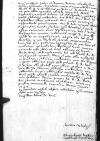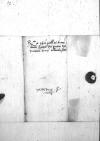Letter #2971
Stanisław HOZJUSZ (HOSIUS) to Ioannes DANTISCUSCracow (Kraków), 1546-06-05
| received Heilsberg (Lidzbark Warmiński), 1546-06-14 Manuscript sources:
Prints:
| ||||||
Text & apparatus & commentary Plain text Text & commentary Text & apparatus
Reverendissimo in Christo Patri et Domino, domino
Reverendissime in Christo Pater et Domine, domine colendissime.
Officiosissimam servitutis meae commendationem.
Mitto Reverendissimae Dominationi Vestrae litteras ex
Deum precor, ut Reverendissimam Dominationem Vestram diu servet incolumem et felicem.
Cuius me gratiae commendo.
Eiusdem Reverendissimae Dominationis Vestrae servitor deditissimus
Postscript:
Ex comitiis nihil adhuc allatum esse mirari satis non possum.


 AAWO, AB, D. 19, No59_2
AAWO, AB, D. 19, No59_2